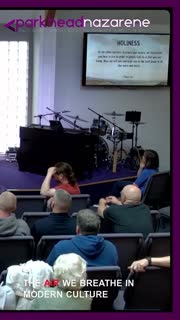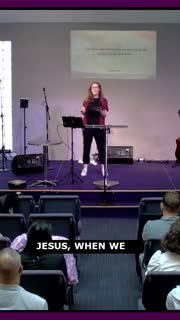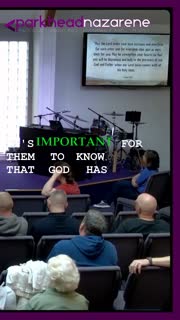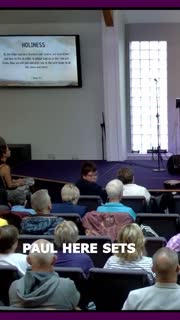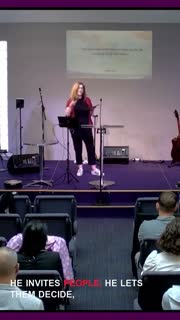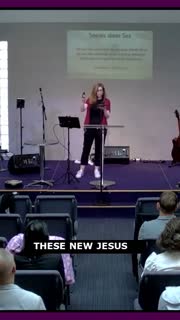Living a Life Pleasing to God: A Call to Holiness
Devotional
Sermon Summary
Bible Study Guide
Sermon Clips
### Quotes for outreach
1. "God is calling a holy people to himself. So before any further ado, let's get into our teaching text this week. Chris, are you all right on the slides or do you want me to do them? I'll do them. Right, here we go. I don't think it's working. There we go. Right, teaching text." [00:10] (20 seconds)
2. "The air we breathe in modern culture would say we have to live a life pleasing to who? Yourself. That could be the modern manifesto, right? Live a life pleasing to yourself. In postmodern culture we're also deeply suspicious of authority of any kind. We live in a very unique moment in history where we've deconstructed authority of almost every type." [06:24] (26 seconds)
3. "But the truth is life on this planet and the gospel of Jesus Christ is not about us and our personal fulfillment. We are not the center of the universe. God is. We don't get to define morality. God does. We did not create ourselves. God did." [07:59] (22 seconds)
4. "Jesus, when we encounter him in the gospels, never forces anyone to follow him. He invites people, he lets them decide, but he doesn't pander to their preferences. And for those of us who do choose to follow Jesus, we follow him because he wants us to follow him. And we follow Jesus on his terms, not on our own." [09:37] (19 seconds)
5. "The central purpose of our life is no longer personal fulfillment or pleasure or living our best life now. It's learning to live to please God. Do this more and more, Paul says, not what's kind of the minimum commitment I can get away with in order. To still call myself a Christian, but the wholehearted reorientation of our whole lives to God out of love and devotion for him." [09:37] (26 seconds)
### Quotes for members
1. "It's important for them to know that God has called them into his glorious kingdom but that calling is also a lifelong response on our part and a responsibility on our part. They are called as are we to live to kingdom standards. The constitution of their kingdom citizenship requires holiness not impurity." [04:50] (24 seconds)
2. "Paul here sets out the correct orientation for every human life and that's to learn to live a life pleasing to God. The air we breathe in modern culture would say we have to live a life pleasing to who? Yourself. That could be the modern manifesto, right? Live a life pleasing to yourself." [06:24] (22 seconds)
3. "And in case they have forgotten instructions for behavioral living that he gave them, Paul reminds them, no uncertain terms. It is God's will that you should be sanctified, that you should avoid sexual immorality, that each of you should learn to control your own body in a way that is holy and honorable, not in passionate lust like the pagans who do not know God." [09:37] (-557 seconds)
4. "Paul addresses these new Jesus believers, especially the men in this case, with an entirely new story about sex, sexual activity, and marriage. Paul addresses these new Jesus believers, especially the men in this case, with an entirely new story about sex, sexual activity, and marriage." [14:06] (13 seconds)
5. "Paul addresses these new Jesus believers, especially the men in this case, with an entirely new story about sex, sexual activity, and marriage. Paul addresses these new Jesus believers, especially the men in this case, with an entirely new story about sex, sexual activity, and marriage." [14:37] (13 seconds)
Ask a question about this sermon
1. "God is calling a holy people to himself. So before any further ado, let's get into our teaching text this week. Chris, are you all right on the slides or do you want me to do them? I'll do them. Right, here we go. I don't think it's working. There we go. Right, teaching text." [00:10] (20 seconds)
2. "The air we breathe in modern culture would say we have to live a life pleasing to who? Yourself. That could be the modern manifesto, right? Live a life pleasing to yourself. In postmodern culture we're also deeply suspicious of authority of any kind. We live in a very unique moment in history where we've deconstructed authority of almost every type." [06:24] (26 seconds)
3. "But the truth is life on this planet and the gospel of Jesus Christ is not about us and our personal fulfillment. We are not the center of the universe. God is. We don't get to define morality. God does. We did not create ourselves. God did." [07:59] (22 seconds)
4. "Jesus, when we encounter him in the gospels, never forces anyone to follow him. He invites people, he lets them decide, but he doesn't pander to their preferences. And for those of us who do choose to follow Jesus, we follow him because he wants us to follow him. And we follow Jesus on his terms, not on our own." [09:37] (19 seconds)
5. "The central purpose of our life is no longer personal fulfillment or pleasure or living our best life now. It's learning to live to please God. Do this more and more, Paul says, not what's kind of the minimum commitment I can get away with in order. To still call myself a Christian, but the wholehearted reorientation of our whole lives to God out of love and devotion for him." [09:37] (26 seconds)
### Quotes for members
1. "It's important for them to know that God has called them into his glorious kingdom but that calling is also a lifelong response on our part and a responsibility on our part. They are called as are we to live to kingdom standards. The constitution of their kingdom citizenship requires holiness not impurity." [04:50] (24 seconds)
2. "Paul here sets out the correct orientation for every human life and that's to learn to live a life pleasing to God. The air we breathe in modern culture would say we have to live a life pleasing to who? Yourself. That could be the modern manifesto, right? Live a life pleasing to yourself." [06:24] (22 seconds)
3. "And in case they have forgotten instructions for behavioral living that he gave them, Paul reminds them, no uncertain terms. It is God's will that you should be sanctified, that you should avoid sexual immorality, that each of you should learn to control your own body in a way that is holy and honorable, not in passionate lust like the pagans who do not know God." [09:37] (-557 seconds)
4. "Paul addresses these new Jesus believers, especially the men in this case, with an entirely new story about sex, sexual activity, and marriage. Paul addresses these new Jesus believers, especially the men in this case, with an entirely new story about sex, sexual activity, and marriage." [14:06] (13 seconds)
5. "Paul addresses these new Jesus believers, especially the men in this case, with an entirely new story about sex, sexual activity, and marriage. Paul addresses these new Jesus believers, especially the men in this case, with an entirely new story about sex, sexual activity, and marriage." [14:37] (13 seconds)

